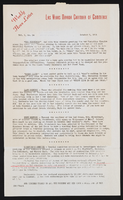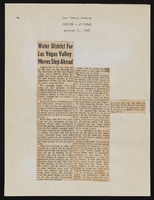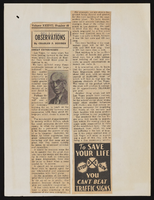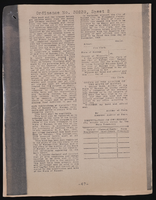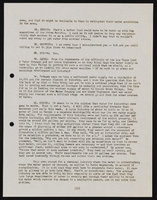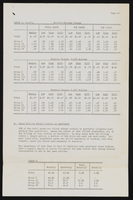Search the Special Collections and Archives Portal
Search Results

Transcript of roundtable interview about Kristallnacht with Esther Finder, Raymonde Fiol, Alexander Kuechel, Philipp Meinecke and Rabbi Felipe Goodman, by Barbara Tabach, March 17, 2015
Date
Archival Collection
Description
In this interview, the participants discuss their experiences during Kristallnacht, and the commemoration events in southern Nevada with Holocaust survivors and their families. Mr. Kuechel recounts his journey through concentration camps and being liberated by the Russians. Rabbi Goodman talks about meeting Mr. Meinecke, whose grandfather was a high-ranking SS officer. Meinecke discusses his upbringing in Germany and trying to learn about his family's involvement in the Holocaust, and the hope he felt after the fall of the Berlin Wall as Jews returned to Germany. The group discusses the importance of Holocaust education because there are still so many untold stories.
On November 9th to November 10th, 1938, in an incident known as Kristallnacht, Nazis in Germany torched synagogues, vandalized Jewish homes, schools and businesses, and killed close to one hundred Jews. In the aftermath of Kristallnacht, also called the Night of Broken Glass, some thirty thousand Jewish men were arrested and sent to Nazi concentration camps. German Jews had been subjected to repressive policies since 1933 when Nazi Party leader Adolph Hitler became chancellor of Germany. However, prior to Kristallnacht these Nazi policies had been primarily nonviolent. However, after Kristallnacht conditions for German Jews grew increasingly worse. During World War II, Hitler and the Nazis implemented their so-called final solution to what they referred to as "the Jewish problem" and carried out the systematic murder of some six million European Jews in what is now commonly known as the Holocaust.
Text

Letter from F. R. McNamee (Los Angeles) to Leo McNamee about surface and underground water rights, May 23 1924
Date
Archival Collection
Description
Though the deed from Stewart makes no mention of water rights, it was McNamee's opinion that the water was part of the land and went with it.
Text

Letter from R. L. Adamson (Los Angeles) to F. H. Knickerbocker, August 16, 1929
Date
Archival Collection
Description
Summary of the lands purchased from the Stewart family by the Los Angeles & Salt Lake Railroad Company.
Text

County agent project progress report, Domestic water supply for Bunkerville and Mesquite, November 1, 1939
Date
Archival Collection
Description
Wells drilled previously were not sufficient to solve area water problems. Wittwer recommended consulting with the United States Geological Survey and State Engineer before any more wells were drilled. Report signed by John H. Wittwer as County Extension Agent. Project Number: State Office No. 282, Clark Co. No. 22. Name of Project: Domestic water supply for Bunkerville & Mesquite.
Text

